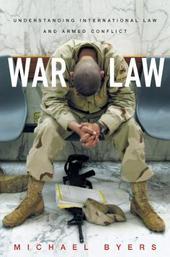
|
War Law: Understanding International Law and Armed Conflict
Paperback / softback
Main Details
| Title |
War Law: Understanding International Law and Armed Conflict
|
| Authors and Contributors |
By (author) Michael Byers
|
| Physical Properties |
| Format:Paperback / softback | | Pages:224 | | Dimensions(mm): Height 210,Width 140 |
|
| ISBN/Barcode |
9780802142948
|
| Classifications | Dewey:341.6 |
|---|
| Audience | |
|---|
| Edition |
First Trade Paper Edition
|
|
Publishing Details |
| Publisher |
Grove Press / Atlantic Monthly Press
|
| Imprint |
Grove Press / Atlantic Monthly Press
|
| Publication Date |
15 March 2007 |
| Publication Country |
United States
|
Description
International law governing the use of military force has been the subject of intense public debate. Under what conditions is it appropriate, or necessary, for a country to use force when diplomacy has failed? Michael Byers, a widely known world expert on international law, weighs these issues in War Law. Byers examines the history of armed conflict and international law through a series of case studies of past conflicts, ranging from the 1837 Caroline Incident to the abuse of detainees by U.S. forces at Abu Ghraib prison in Iraq. Byers explores the legal controversies that surrounded the 1999 and 2001 interventions in Kosovo and Afghanistan and the 2003 war in Iraq; the development of international humanitarian law from the 1859 Battle of Solferino to the present; and the role of war crimes tribunals and the International Criminal Court. He also considers the unique influence of the United States in the evolution of this extremely controversial area of international law. War Law is neither a textbook nor a treatise, but a fascinating account of a highly controversial topic that is necessary reading for fans of military history and general readers alike.
Reviews"If Britain suspected that a Boston bar barbored IRA terrorists, would it be justified in lobbing cruise missiles into the city? Byers . . . achieves plenty of similar provocations in this lucid primer." "Should be read, and pondered, by those who are seriously concerned with the legacy we will leave to future generations." -- Noam Chomsky "Succinct, highly readable, and important."
|